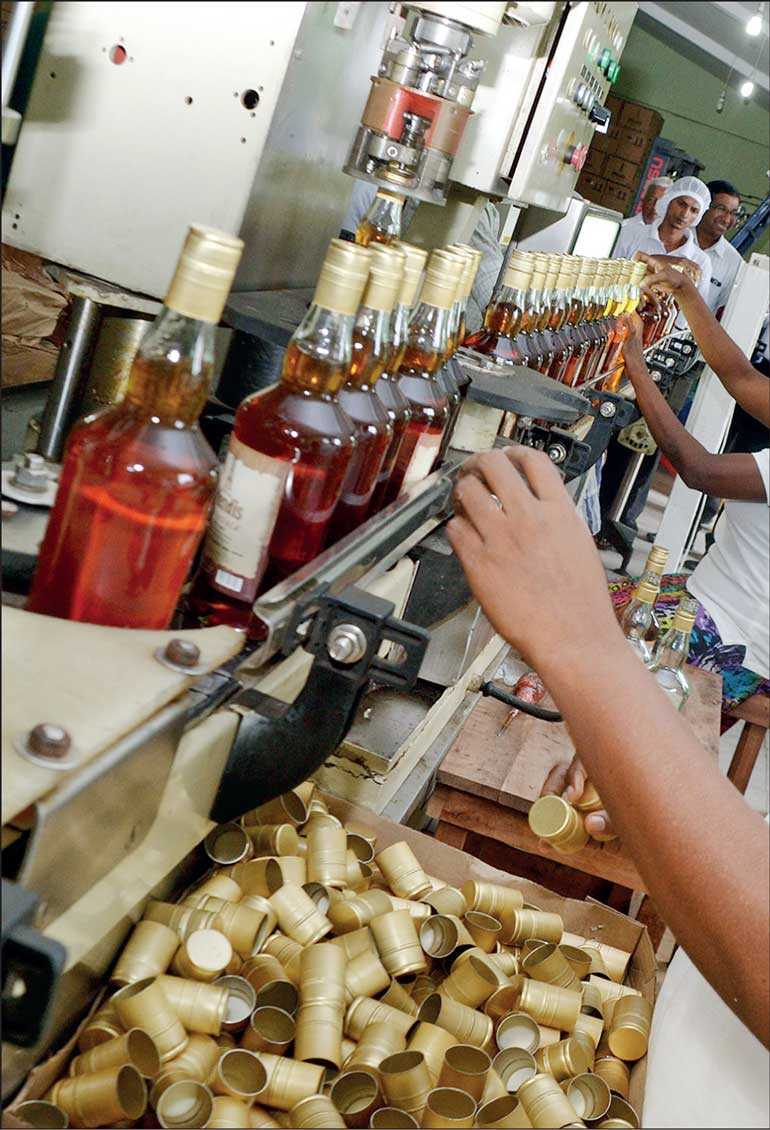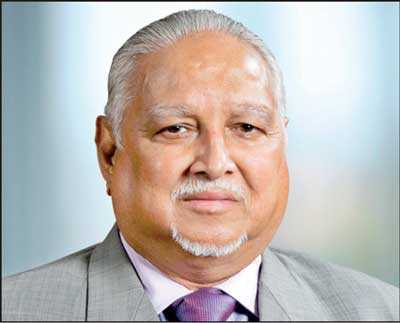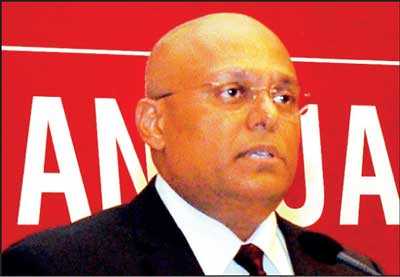Friday Feb 27, 2026
Friday Feb 27, 2026
Wednesday, 9 January 2019 00:00 - - {{hitsCtrl.values.hits}}

By A Special Correspondent
An in-depth investigation conducted by a team of private sector professionals has revealed that the Government is losing a whopping Rs. 10-12 billion annually in Excise Duty from illicit manufacturers of alcohol.
They claim that the legal beer and arrack manufacturers, Distilleries Company of Sri Lanka (DCSL) and Lion Brewery PLC, alone pay a consolidated Rs. 80 billion to State coffers annually, which accounts for 71% of the total Excise Duty revenue and that a majority of the illicit manufacturers get away scot-free and deprive the Government of Rs. 10-12 billion annually.
Excise Department lag
They point out that these whopping losses are a result of the Excise Department not evolving over the last 100 plus years and proving their inability over the years. The investigation has also alleged the Excise does not use modern technology or embed modern practices.
 |
Harry Jayawardena |
 |
Suresh Shah |
It has also been seen by the investigators that, unfortunately, the Department of Excise does not allow the Police, the Consumer Affairs Authority or any other department to interfere in Excise-related matters, which has led to suspicion with regard to the operations of the Department itself.
The existing model has been proved to be a grossly ineffective model costing the Government billions annually in revenue terms.
It has been further evidenced that the Excise Department has failed to introduce standards and ensure food safety aspect of the millions of consumers due to poor enforcement in relation to illicit and adulterated products and due to the inability of introducing new policies.
Now the question which has loomed is whether the Excise Department officials are being “protected” by anyone to see that these Excise Duties are unpaid by certain illicit and illegal manufacturers and also as to why the Excise Department keeps on turning blind eyes and deaf ears on this all-important subject.
Questions are also being raised as to whether they are duping the Finance Minister and Ministry officials to abuse funds which are due to State coffers to the tune of Rs. 10-12 billion, which is almost as colossal as the losses amounting from the Central Bank Treasury bond scam!
They also recommend to the Finance Minister to appoint a Commission to gather information and galvanise public opinion to stop this organised financial crime.
Recent reports highlighted some of the critical insights in terms of the revenue leakages related to the alcohol industry and the unlawful behaviour of the regulators where they turned a blind eye to this vexing situation.
It is also moot to note that the estimated illegal volume according to the World Health Organization is 40% of the market. On the contrary, 60% of legitimate volumes contribute Rs. 120 billion in terms of Excise Duty revenue.
This independent in-depth review of the alcohol industry arose consequent to the annual reviews of the largest beer brewer, Lion Brewery Ceylon PLC, and the largest spirit manufacturer, Distilleries Company of Sri Lanka PLC, having constantly alleged an unfair and un-level playing field within the industry in their Annual Reports.
Both companies contribute a consolidated Rs. 80 billion annually which is 71% of the total Excise Tax revenue.
Both companies have stated the irregularities and the implications of the Commissioner of Excise being unable to correct or deliberating avoiding correction of this gross discrepancy.
Unfair and unethical practices
DCSL Chairman Harry Jayawardena in his Annual Report to shareholders for the year ended 31 December 2018, has said (inter-alia): In the face of continuous unfair and unethical practices favouring a few unscrupulous elements, we continue to operate in an industry which in years has not offered a level playing field. All of these defects, loopholes, shortcomings and man-made situation in the industry have been brought to the notice of responsible authorities, as well as the shocking revelations published by newspapers of these findings of the Special Presidential Commission set up by His Excellency the President, have not had any effect to date. This may be because the very people who are responsible to take action may be siding with the wrongdoers.
If the Excise Department cannot solve this within the organisation it is advisable for the Minister of Finance and senior Ministry officials to intervene to attract and safeguard this revenue, the investigators have pointed out.
Among key issues highlighted by Jayawardena in his Annual Report to shareholders was the drastic increase in the illegal production of liquor, which has been estimated to be 40% in Sri Lanka according to the WHO Global Status Report for 2018.
Harry Jayawardena in his 2018 DCSL Annual Report has also said: When compared with last year, we have noted a drastic increase in the illegal production of liquor.
It was revealed that illegal alcohol products are available in several types and used by two separate users:
a. Unlawful arrack manufacturers
b. Consumers who are looking for a cheaper alcoholic product
Some products are meant for manufacture. Arrack by arrack manufacturers who produce alcoholic beverages and evade tax as unrecorded produce. Un-recorded illegal products business is an organised mafia where established distillers are involved in large-scale tax fraud.
Jayawardena in his 2018 DCSL Annual Report has also said: Cogent evidence has surfaced that some unscrupulous manufacturers of alcohol are offering staggering prices to purchase retail licenses with the sole intention of channelling their non- invoiced, tax-unpaid liquor through their outlets and thereby evading a colossal amount of tax revenue to State coffers.
Illegally-produced ethanol made from artificial toddy
Illegally-imported ethanol
The rest of the products are meant for direct consumption targeted to consumers who wants a “cheaper” option
Moonshine, artificial toddy for direct human consumption
Illegally imported or counterfeited whiskeys and other foreign liquors.
(Point 1-4 detailed below)
When probing into details of the above, manufacturer-related malpractices can be curbed easily due to the lower number of institutions, individuals and locations engaged in the industry. Hence in this article the primary focus is to understand the connection of toddy and illegally-imported ethanol to the alcohol industry and the mafia involved.
Illegally-produced ethanol made from artificial toddy
Artificial toddy is one of the primary sources of illegal alcohol sourced by unethical manufacturers to dodge the source and evade tax. This is an organised activity continuously practiced by unscrupulous manufacturers with the blessings of the authorities.
Jayawardena has said in his 2017 DCSL Annual Report: Compared with last year we have observed a remarkable drop in the illegal production of liquor. However, toddy makers release large quantities of artificial toddy to manufacturers while the Department of Excise turns a Nelsonian eye. The damaging effect and colossal impact to the final product makes such products injurious to health. Toddy made artificially is transported to the south to make spirits with the blessings of the enforcement authorities. As a control measure to prevent adulterated toddy tree tapping license scheme was re-introduced, where all the trees to be licensed to tap for toddy. Despite this, the artificial toddy is manufactured by so called toddy collectors in mass scale using sugar, yeast and harmful chemicals from fertiliser such as urea, without consumers’ knowledge. This toddy is used to manufacture registered arrack brands available in the market.
Lion Brewery PLC CEO Suresh K Shah in his 2017-18 Annual Report to shareholders, has said: The toddy that is now available in the market is another beverage that has potential to harm those that consume it. Today’s toddy is more an artificial chemical concoction and is rarely from either the coconut or kithul tree. There is much evidence to suggest that synthetic urea, which also has to its application in fertiliser is widely used in the preparation of this toddy. Synthetic urea is manufactured with anhydrous ammonia and is used by toddy manufacturers as a nitrogen source to help multiply the yeast used to convert fermentable sugars to alcohol. It is said that a substance known as ‘Ceylon Paste’ is also used in the production of toddy. With the coconut crop gradually declining, some manufacturers are apparently using this artificial toddy as a raw material to produce arrack. The health authorities would do well to investigate the veracity of these reports.
Further, Jayawardena has stated that using harmful toddy for manufacturing arrack is a common phenomenon and it triggered a greater threat on the traditional toddy industry. In the absence of natural toddy, DCSL and legitimate arrack industry who uses 100% natural toddy is under serious threat for survival. Excise department has not
Harry Jayawardena in his 2017 DCSL Annual Report said: We are singlehandedly nurturing the traditional toddy tapping custom, although only a handful of such genuine tappers remain in existence. Even though the country lacks trained toddy tappers, the Department of Excise is unfortunately not focusing on this issue to help the industry and to ensure the production of genuine coconut toddy. A unique and traditional Sri Lankan industry which has been passed down from generation to generation over centuries is gradually becoming an endangered industry. This sorry state of affairs is the direct result of the proliferation of illegal, artificial toddy manufacturers, who fuel the illegal alcoholic beverage business by producing cheap artificial toddy, unfit for human consumption. As a result, traditional toddy suppliers, who are unable to compete with such low cost artificial toddy, are finding that their rich legacy is becoming unsustainable. Amidst the barren wasteland of illegal practices and disregard for tradition, we believe that the DCSL PLC is the only company that produces 100% natural coconut arrack, using 100% pure coconut toddy. The toddy is distilled at our own distilleries, thereby providing consumers with a 100% natural product.
Said context, in addition to the loss of Government revenue, artificial toddy creates serious health hazards to the consumers who consumed adulterated products by unethical registered manufacturers. As the regulator, the Department of Excise has not taken precautions to introduce proper standards to ensure consumer safety.
In summary, the toddy industry is purposely abused to source illegal ethanol by registered arrack manufacturers which causes huge losses to Excise revenue and health issues to the general public due to lack of control by the authorities.
Primarily, the Excise Department needs to enforce the regulations at the point tapping is done. It is understood that the tapping license and the yield can be easily audited by each collector and it has not done recently from the time it was introduced.
Further it is recommended to introduce product standards for toddy, arrack and manufacturing processes such as ISO standards to ensure safety of the consumers. This is a primary duty of the Commissioner General of Excise to protect the consumers who pay over Rs. 120 billion as tax through the Department of Excise.
Illegally-imported ethanol
Illegally imported ethanol spirits is also a major concern for the industry. Ethanol comes in various forms, and vary in quality. It is evident that ethanol is illegally smuggled into the country.
Harry Jayawardena in his 2018 DCSL Annual Report said: We have also observed that a large amount of spirit is being smuggled into the country passing through the customs without payment of taxes by classifying the product as paint removers, thinner and spirit for eau de cologne, etc., depriving the State of billions of rupees. Such acts are carried out by powerful people belonging to political groups (and this is well-known in the market) with the connivance of the enforcement authorities who turn a blind eye and deaf ear.
Harry Jayawardena in his 2016 DCSL Annual Report said: Duplicated, adulterated products are frequently available in the hill country and north and east where stringent policing does not take place up to the required standard. As a result, State coffers are losing revenue as the required standard of checking is either not carried out or not supervised at all by the regulators. It is common knowledge that legislators of the last Government imported and distributed ethanol according to their whims and fancies. We commend the Minister of Finance for tightening the loopholes thereby preventing large scale movement of ethanol into the market illegally.
According to the Annual Report published by the Department of Excise for 2016 there are only 24 spirits and beer manufacturers and 30+ active toddy bottlers. These manufacturers contribute 90+% of the Excise Tax generated and should be the primary focus of the Department. But it is very sad to note that the Department of Excise, responsible for regulating alcohol manufacturing, has repeatedly failed to regulate less than 60 manufacturers and secure the tax collection effectively.
To ensure total tax collection it is vital to ensure the total pure alcohol used to manufacture alcoholic beverages and the amount sold out to the market are recorded properly. This can be easily done through computerising the network of manufacturers to record data from the point of purchase of alcohol to the invoice of the final product to the retail customer. Through this Excise will have greater visibility and control of the overall industry and there will be lot more transparency in the system to eliminate fraud. This can be further improved by introducing a tax stamp system where every product is stamped with a tax label issued from the Government.
Systems of this nature are not introduced by the authorities to keep it complicated so manufacturers can maintain their own network of outlets to sell the illegally produce products.
Staggering prices for retail licenses
Jayawardena in his 2017 DCSL Annual Report said: Apart from the existing loss of revenue due to the inefficiencies, cogent evidence has surfaced that some unscrupulous liquor traders are offering staggering prices to purchase retail licenses with the sole intention of channelling their non-invoiced, tax unpaid liquor and thereby evading a colossal amount of tax revenue to State coffers. This issue has reached unprecedented heights, whereby six traders are currently controlling over 200 licenses out of approximately 1000 licenses in the name of their kith and kin, thereby defrauding the State of billions of rupees whilst the regulators turn a deaf ear and blind eye. This is about one-fifth of the total licenses. The fact that these unscrupulous traders are paying such exorbitant amounts to licensees itself is a proof of the existence of such illegal trade and indicates how rampant corruption has spread like a disease in the industry. Unfortunately, such businesses are carried out with the connivance of the enforcement authorities who are supporting these traders.
Considering the above, it is evident that current regulation system is ineffective and inefficient resulting huge losses to the Government revenue. Hence it is vital to have a very strong leadership to revamp the department. The first-ever Female Commissioner General Meegasmulla took very strong initiatives and managed to keep a full stop to artificial toddy and related corruption, but she headed the department for a very short time and with her departure, illicit toddy started poaching into the market.
Outdated Excise Ordinance
In the journey of re-vamping the Excise Department to make the department more effective, one of the biggest barriers are the outdated Excise laws of the country and the colonial mindset of the officials as ‘British/Suddha has given a perfect ordinance’.
Harry J in the 2018 DCSL Annual Report said: The Excise Ordinance which came into operation on 1 January 1913 is now 105 years old. It is high time that legislators introduce a practical, new ordinance in place of archaic laws to suit modern day requirements and make it easier for manufacturers and consumers to carry out their day to day operations as the industry has gone through so many changes since its Inception.
Suresh K Shah in his 2018 LBCL Annual Report said: Much credit is due to the Government and the Minister of Finance for implementing reforms pertaining to excise taxes. We hope they now take the next step of modernising the prevailing Excise Ordinance. This legislation was introduced in 1913 and is no longer conducive to facilitating and regulating modern businesses. In the 105 years since then, a number of rules and regulations have also been introduced. Since these rules and regulations are outside the Ordinance, there is much confusion and leaves space for inconsistent interpretation and in some circumstances, rent seeking. Further, many of these rules and regulations – like the Ordinance – are no longer relevant.
The Excise Ordinance was introduced in 1913. It is 105 years old. It is outdated and does not cater to the needs of the modern day requirements. During the last 100 years products and license types defined in the ordinance have changed or are not in existence. Most of the new products are not in the ordinance. Definitions and accepted standards for the products are not defined in the Excise Ordinance. Hence enforcement has become grey and complicated.
As the regulator, the Department of Excise has not taken any initiative to change the ordinance due to lack of capability or purposely it is kept grey resulting in loss of revenue to the Government.
Harry J in the 2017 DCSL Annual Report: Duplicated, adulterated products are frequently available in the hill country and the north and east where stringent policing does not take place. As a result, the State is losing significant revenue; as the required standard of checking is either not carried out, or not supervised at all by the regulators. In the north and east, products are delivered to licensees almost 20% cheaper and it is obvious that these products are non-invoiced and taxes unpaid.
The outdated Excise Ordinance and its implications have been highlighted by both the leading manufacturers over the years but no action has taken by the department, which has resulted in the sorry state of affairs in this industry today.